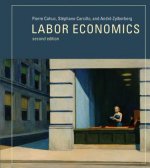
Kód: 04477646
Role of Unions in the Twenty-first Century
Autor Boeri
In this book, first-rate international scholars in the field explore the role that unions are likely to play in the changed economic environment of the new century. Questions discussed include: What will unions look like in the ye ... celý popis
- Jazyk:
 Angličtina
Angličtina - Vazba: Brožovaná
- Počet stran: 320
Nakladatelství: Oxford University Press, 2001
- Více informací o knize

Mohlo by se vám také líbit
-

School Inspection & Self-Evaluation
1942 Kč -

Jazz Guitar Sight-Reading
265 Kč -

Monarch of the Glen - The Life of a Roebuck
729 Kč -

Reading Bug
343 Kč -

Jazz Hanon
413 Kč -

Historical Corpus Stylistics
1741 Kč -

Französisch in Luxemburg
1207 Kč
Dárkový poukaz: Radost zaručena
- Darujte poukaz v libovolné hodnotě a my se postaráme o zbytek.
- Poukaz se vztahuje na celou naši nabídku.
- Elektronický poukaz vytisknete z e-mailu a můžete ihned darovat.
- Platnost poukazu je 12 měsíců od data vystavení.
Více informací o knize Role of Unions in the Twenty-first Century
Nákupem získáte 288 bodů
 Anotace knihy
Anotace knihy
In this book, first-rate international scholars in the field explore the role that unions are likely to play in the changed economic environment of the new century. Questions discussed include: What will unions look like in the years to come? Which kind of interest groups will they represent? How important will be the broader political role of unions? To what extent do unions care about future generations? Part One documents a tendency towards greater decentralization in collective bargaining and declining union membership rates in most European countries. The process of decentralization may only be partly reversed by social pacts of the type that occurred in several EU countries in the run-up to EMU. Yet this type of co-ordination is likely to be increasingly unstable in a context where membership is falling, hence will inevitably require government intervention. Not all governments may wish to intervene in wage setting, however, as there are strong reasons to believe that such intervention could impose wage rigidities in some parts of the economy and lead to non-enforcement in other parts. Moreover, under EMU what matters is ultimately co-ordination of bargaining at the pan-European level rather than simply at the national level. Such higher-level, transnational co-ordination is not likely to occur for a long time to come because of the huge costs that it involves. Some transnational co-ordination may occur within multinational firms, however, as costs are likely to be much lower at this level. Part Two characterizes the intergenerational conflicts present within unions. Unions may be able to better respond to the needs of the unemployed without losing the support of current employees when they become involved in the running of unemployment benefit systems, as has been the case in those countries applying the so-called Ghent system. They may also succeed in making the system more efficient by, for example, contributing to the reduction of moral hazard problems associated with the provision of unemployment insurance. Unions are, however, unlikely to solve the latent conflict between their younger and older members in a context where the population is ageing, since they tend to preserve the status quo when it comes to cutting pension benefits in order to deal with demographic transition. The cost of these dynamic inefficiencies may be accepted by younger generations as long as an intergenerational contract can be enforced whereby unions guarantee that the status quo will be preserved, and are credible in their commitment. Unions could play a key role in this implicit intergenerational pact because they are long-lived agents---certainly longer-lived than many governments---but, under present conditions, this pact may be no longer credible.
 Parametry knihy
Parametry knihy
Zařazení knihy Knihy v angličtině Economics, finance, business & management Industry & industrial studies Industrial relations, health & safety
2884 Kč
- Plný název: Role of Unions in the Twenty-first Century
- Autor: Boeri
- Jazyk:
 Angličtina
Angličtina - Vazba: Brožovaná
- Počet stran: 320
- EAN: 9780199246588
- ISBN: 0199246580
- ID: 04477646
- Nakladatelství: Oxford University Press
- Hmotnost: 484 g
- Rozměry: 233 × 156 × 17 mm
- Datum vydání: 16. August 2001
Oblíbené z jiného soudku
-

Naked Pilot
513 Kč -

Seasonal Associate
369 Kč -

Working Class Politics In The German Revolution (historical Materialsim, Volume 77)
970 Kč -

Heteromation, and Other Stories of Computing and Capitalism
1022 Kč -

Managing the Risks of Organizational Accidents
1404 Kč -

Health and Safety at Work
1552 Kč -

Safety Differently
1733 Kč -

Health and Safety Pocket Book
1230 Kč -

Public Safety Bomb Suit Standard & Certification Program Requirements
5156 Kč -

Engineering a Safer World
1175 Kč -

Handbook of Industrial Hazards and Safety
4077 Kč -

Warehouse Safety
4809 Kč -

Safety Culture
2655 Kč -

Pride
303 Kč -

Guidelines for Risk Based Process Safety
5952 Kč -

Ultimate Desert Handbook
732 Kč -

OHSAS 18001 Step by Step
454 Kč -

Violence of Financial Capitalism
312 Kč -

Occupational Safety and Health for Technologists, Engineers, and Managers, Global Edition
2539 Kč -

No Shortcuts
593 Kč -

Working in Biosafety Level 3 and 4 Laboratories - A Practical Introduction
2953 Kč -

Security Management for Occupational Safety
3343 Kč -

Human Contribution
1733 Kč -

Raising Expectations (and Raising Hell)
515 Kč -

Guidelines for Safe Process Operations and Maintenance
4198 Kč -

Wobblies of the World
925 Kč -

Settled Asbestos Dust Sampling and Analysis
8242 Kč -

Lean Safety Gemba Walks
1524 Kč -

Definitive Guide to Behavioural Safety
1974 Kč -

Hamilton & Hardy's Industrial Toxicology 6e
6043 Kč -

Sick Building Syndrome
4267 Kč -

Laser Safety
7585 Kč -

Ergonomics and Musculoskeletal Disorders (MSDs) in the Workplace
3814 Kč -

Pew and the Picket Line
2990 Kč -

On the Ground
792 Kč -

Wobbly Life
700 Kč -

Workplace Health Promotion Programs - Planning, Implementation, and Evaluation
3002 Kč -

Jobless Future
960 Kč -

Safety Critical Systems Handbook
4940 Kč -

Decisions Over Decimals - Striking the Balance between Intuition and Information
800 Kč -

Chemistry of Pyrotechnics
3267 Kč -

Health & Safety at Work For Dummies
613 Kč -

Labor Economics
3498 Kč -

Trench Rescue
3824 Kč -

Homestead Strike of 1892
635 Kč -

HAZOP: Guide to Best Practice
2204 Kč -

Normal Accidents
1147 Kč -

Natech Risk Assessment and Management
4614 Kč -

Food Safety Management
3313 Kč
Osobní odběr Praha, Brno a 12903 dalších
Copyright ©2008-24 nejlevnejsi-knihy.cz Všechna práva vyhrazenaSoukromíCookies



 Vrácení do měsíce
Vrácení do měsíce 571 999 099 (8-15.30h)
571 999 099 (8-15.30h)